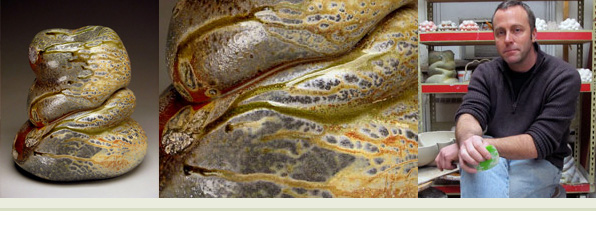Ted Adler is Assistant Professor of Art and Area Head of Ceramics Media at Wichita State University. He received his BA from Lewis and Clark College in Portland, OR in 1993 and his MFA from Ohio University in Athens, OH in 2002. He spent two years as artist-in-residence at the Archie Bray Foundation, He has conducted workshops and been a visiting artist at numerous ceramic centers and universities in this country, including Watershed and The LH Project in Joseph, OR. Adler has exhibited work in Taiwan, Spain, and Canada as well as nationally, including the NCECA National Competition in 1999 and 2003.
What advice would you give a young artist?
Dammit, I AM a young artist!
…Pertaining to the dream of being able to just make, but the reality of having a job that pays the bills.
Of course we would all love the luxury of “just making”, but the truth is that even artists who make their living entirely from their work(unless they are at the absolute top of the pyramid) still have to put time into inventorying their work, building crates, shipping work, keeping financial records, paying taxes, entertaining collectors who visit the studio, reminding the gallery to pay their checks, deciding which worthy fundraiser to donate work to (they call like clockwork during the fund-raising season), and a million other things that require time away from getting your hands dirty and doing what turned you on to art in the first place. Trust me, growing up bites no matter how you try not to grow up at all. However, a day job is a small thing compared to the beauty of being able to afford materials and a place to work. Try to find a job that you can be proud of doing and make work when you’re not sleeping.
Could you comment on after the period after finishing school, and the importance of making?
Make. That’s it. Everything else is what you do in order to get to that part.
Could you comment on having a vision and what it means to be an artist?
“Vision” is tricky. Most of the time, I feel like I can’t find my ass with both hands and a flashlight. Let passion drive you. At your four-decade retrospective, you’ll know what your vision was. Being an artist means you don’t ever get to retire from your job or leave it at the office.
How do you find where you and your work fit in the world?
Artists are conveyors of cultural significance. Pay attention, think a lot and make something meaningful. You’re not so different from everybody else. If it holds meaning for you, it will for others and therefore fits just fine in the world. Your audience will find you. Just make sure you’re aware of it when they do and be appreciative.
How do you respond to interests that may only benefit you monetarily, but aren’t your primary pursuit?
If that’s the case, then re-think your “primary” pursuit. It’s important to live life and experience the world because that’s what feeds the work, but if you don’t bring it back to the work and use it, was it time well spent? Smelling the flowers is not momentary when you do it right.
What have you done to help you get where you are?
The harder I work, the luckier I get. Stay in touch with people you admire and respect, even if they don’t call you back all the time. Surround yourself with people who are smarter and more talented than you are and try to keep up. Tom Orr of the Oregon College of Art and Craft, when I was 24 and a student of his, told me to go out and do as much I can, see as much as I can, and meet as many people as I can. Some of my most cherished friends came into my life as a result of taking that advice. Thanks, Tom. Everything else was just “luck”.
Which do you find exerts a stronger influence on your work, success or failure?
Definitely failure. Failure in the studio means there’s still something to find out, new information. My failures in general just piss me off and fuel my fire. Rejection is good. It gives you a chance to prove the bastards wrong. Also, failure leaves more room for optimism.
What was most difficult for you when you finished school?
I was lucky after college and went straight to an apprenticeship. I was a little lost after that, but took that as a good excuse to travel around Central America. I just got to making work after that. Out of the back of my truck, in a friend’s back yard, whatever. Don’t slow down to get your bearings, just keep moving forward and let opportunity find you. The stuff you bump into when you’re not looking where you’re going might be better than what you were looking for. Then again, maybe having five-year and ten-year plans works better for some people, I don’t know.
